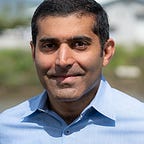Digital Health — Front and Center
The healthcare ecosystem is evolving quickly, and much has been written about the need to rapidly transform into entirely new organizational and care delivery models. COVID-19 has sped this change up. The traditional centralized hub-and-spoke model of connectivity, access, and assets has been disrupted, almost overnight, into a model in which assets like physical sites and facilities are unstaffed and under-used, and perhaps even unnecessary for all but acute care, while connectivity has become a full-mesh of literally an any-to-any network, driving better access and convenience.
It is more apparent than ever that the time for digital health is now.
This new healthcare paradigm is underpinned by technology, whether it is enabling synchronous televisits (also often referred to as virtual visits, or telemedicine), asynchronous interactions over secure messaging (text, photo, video), or facilitating a variety of other interactions and care coordination between patients and their care team.
The COVID-19 pandemic has caused a ripple effect across the entire healthcare industry and has galvanized an alignment of incentives across a broad spectrum of stakeholders in the healthcare ecosystem that has finally felled some of the barriers to adoption and change. Some of the most impactful changes come from federal agencies.
CMS Waivers for Virtual Care
The Centers for Medicare & Medicaid Services (CMS) has announced significant waivers for existing policies that support the expansion of virtual healthcare services. Some of the highlights include:
- Expansion of the number of services eligible for reimbursement when delivered via telehealth
- Parity reimbursement in the amount paid for telehealth and in-person healthcare encounters
- Providers can supervise treatment virtually rather than having to be at the same site
- Advance payments for Medicare providers, enabling solvency and liquidity as they navigate this seachange
Commercial payers are following many of these policies on a more regional level, taking similar steps to help support the inevitable transformation that is required to ensure that both COVID-19 and non-COVID-19 patients have access to ongoing care, whether acute or not.
FCC Grants for Telehealth
Recently the Federal Communications Commission (FCC) announced a $200M COVID-19 Telehealth Funding program to help accelerate the launch and expansion of telehealth services. There have been similar programs administered previously by the FCC to help expand broadband and network connectivity across rural regions (e.g. Connect America Fund). Previous programs have been incredibly valuable for the telecommunications industry, and it is likely that the telehealth program will yield similar benefits for healthcare, and it is significant and important to note that both rural and non-rural healthcare providers are eligible.
The FCC COVID-19 Telehealth program dovetails nicely into the CMS waivers and commercial payer policy shifts. While the latter are addressing reimbursement to ensure that providers can continue to be paid for the services delivered over virtual modalities, the FCC program is helping organizations stand up the infrastructure to realize those virtual care offers.
The FCC funding covers the key components of a comprehensive telehealth and virtual care strategy, including:
- New or enhanced broadband connectivity
- Information services, including remote patient monitoring and management software
- Connected devices that help to instrument and monitor patient health
The program and funding can be used for services for both COVID-19 and non-COVID-19 patients. This greatly broadens the applicability and reach of care. Furthermore, there are no restrictions on the health conditions or types of services offered. We are working with some of our healthcare partners to help them take advantage of the FCC offering to administer their bariatric programs and cardiometabolic health, and with others on funding broader care management and remote patient monitoring initiatives.
The following are examples of eligible organization types we are working with on navigating the application process:
- Community health centers and health centers providing healthcare to migrants
- Not-for-profit hospitals
- Rural health clinics
- Post-secondary educational institutions offering healthcare instruction, teaching hospitals, and medical schools
It is encouraging to see the FCC moving quickly to fund these initiatives. Applications have been open since April 13th, and allocations are being made on a rolling basis. Several organizations have already received funding. This expediency is welcomed and imperative in a time of crisis.
It will take the collective will, focus, and determination from all of us: providers, payers, patients, policymakers, and solution providers to overcome the current pandemic. In this moment, we have an opportunity to build new models of care infrastructure and delivery. Let’s not let his moment pass without embracing it.
We’re Here to Help
As Carium navigates this pandemic as a company and a team, our focus is on how we can help in this time of need. The breadth of our platform allows us to help providers of all types, ranging from primary care clinics to large health systems.
On the east coast, we helped a primary care group develop a “Safe at Home” program, which automatically triages COVID-19 symptoms and provides remote patient monitoring for Medicare patients with chronic conditions to ensure that they stay safe and healthy. On the other side of the country, we’re helping our partners deliver care management services remotely, keeping at-risk patients away from the healthcare settings, and reducing the risk of transmission, enabling the care team to effectively care for patients from the safety of their homes.
Our team at Carium is here to help. Contact us to learn more about the CMS or FCC programs, and follow us on Twitter and LinkedIn to stay updated on the latest developments across the healthcare industry.
